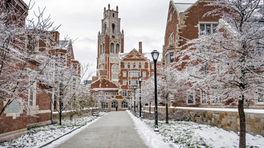3 Quick Tips for Spicing Up Your College Application Resume
- Emily T Lamonte

- Oct 29, 2020
- 3 min read

You’ve spent the past 3+ years of high school racking up high test scores, awards, volunteering hours, and internship experiences (perhaps more). And now, the big day has arrived: you have to compile all of your academic and extracurricular triumphs and experiences into a resume for your college applications. But there is just one issue: how exactly do you make your resume interesting and, more importantly, effective?
First, let’s discuss some important features of a high school resume. In general, your resume should follow this format:
Section 1: Education (GPA, rank, SAT/ACT/AP/IB test scores)
Section 2: Research/Internships (related to desired major)
Section 3: Activities (academic co-curriculars and extra-curriculars)
Section 4: Volunteering
Section 5: Honors and Awards
Section 6: Skills, Talents, and Achievements (non-academic yet informative)
Okay, now let’s walk through three quick tips on how to spice up your resume:
1. Organization - List information from most significant to least.
Wherever possible, order the information based on degree of involvement and relevance to your desired major, not just chronologically.
For example, if you are applying to a STEM major and founded a research group at your high school, for which you spend 20 hours a week coordinating (and whatever else), then this should be at the top of your “Activities” section.
Conversely, if you are an active member of the National Honors Society but basically just attend meetings once a week and have no leadership role, then you should still include this in your resume, but you should place it lower in the “Activities” section. Also, you should still highlight your distinct role, however minor it may seem.
2. Length - Fill up as much space as you need to -- and maybe more.
Don’t limit your resume’s page count to one page unless a college requires you to do so; instead, add as much content as you can. In fact, you may even want to break up “single” activities into two distinct roles in order to fill out your resume and better demonstrate various responsibilities in a single organization. This is definitely a situation where more is more.
Also, you should try to include at least 10 activities and 10 volunteering activities. And when it comes to listing out what you did, try to create three separate bullet points of unique information. Similarly, you should try to think of at least 5 awards/honors, something that the Common Application requests, so you may as well be ready.
Finally, don’t forget the last section: Skills, Talents, and Achievements. This is a great area for showing off other parts of your background that don’t really fit in anywhere else, such as travel and hobbies.
3. Specifics - Use names, numbers, and other details as much as possible.
Details usually make the information in your resume more impressive and concrete. So be sure to explain what you think should be self-evident or widely known. Also, write out information that you may normally abbreviate. There are rare cases in which the terms are abundantly clear -- such as SAT, ACT, IB, and AP -- but, in general, you should assume that the admissions officer will not be entirely familiar with what you have listed in your resume.
Here are some ideas: Write out the full names of organizations, add the name of your high school to any school-related clubs, include any numbers related to your performance or the magnitude of any role or award.
For example, “Marching Band” should say “Austin Marching Band.” “State Solo & Ensemble: Rating of 1” for an award should clarify that a Rating of 1 is considered the highest honor of the most elite players in the state. And for an internship, “Worked in a lab that researched cancer” should be revised to say more specifically something like “Supervised the production of 12 amino acids crucial for blocking the growth of malignant skin cells by using a Micro Viewer 1200X.”
Overall Thoughts
When building your resume, it is important to remember that you want to impress the college admissions officers while also giving them a good picture of your journey as a high school student. Don't sell yourself short, especially when it comes to listing information that seems unimportant to colleges. Some of the most interesting and distinctive parts of our personalities are related to activities in these "nonacademic" areas. Be thorough when remembering and documenting the past 3+ years of your life!
* * * *
Need last-minute help spicing up your resume before applying to college? We can gladly help you! Check out our College Admissions Services for more information. Don’t know where to start? No worries. Set up a FREE 1-1 consultation.































